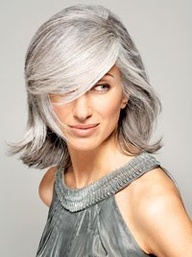Aging Hair and How It Turns Gray: Hair Lingo and the Stress Connection
-
 Ready for some hair lingo?
Ready for some hair lingo?
The researchers examined cell cultures of hair follicles. Results showed that our hair naturally produces hydrogen peroxide (a powerful bleaching agent), which catalase (an enzyme) usually breaks down into water and oxygen. In aging hair, catalase levels are lower, so hydrogen peroxide isn’t broken down and builds up in the hair follicle. That build-up leads to damage.
Normally, other enzymes (MSR A and B) can repair that damage, but their levels also dwindle as we get older. The combination of high levels of hydrogen peroxide and low levels of MSR A and B disrupts another enzyme (tyrosinase) that creates melanin (the pigment that gives your hair color) and blocks it from coloring your hair. “Gray hair” is simply hair without pigment.
In plainer terms: Hydrogen peroxide literally bleaches the color out of aging hair.
- Beauty connection
- When older women bleach their hair, the effect isn’t quite the same as it was when they were young. Hydrogen peroxide can interact with the dye, making hair color much harder to manipulate. Understanding why hair grays is prompting scientists to test chemical reactions that might unlock the fountain of youth, or the ability to reverse graying!
-
Stress and your B's
We know that stress uses up vitamin B, and experiments with black rats deprived of B vitamins resulted in their hair going white.
Similarly, some studies in humans have shown that certain B vitamins taken in large doses can begin to reverse the process of greying. Japanese research suggests that hair follicles are susceptible to the same sort of stresses that damage DNA.
This type of stress, known as oxidative stress, is caused by exposure to cigarette smoke, UV light and pollution. There is also an association between emotional stress and oxidative stress, which means that the GHOSTS blaming their grey hairs on stress might have a point.
Call Kasia Organic Salon today to consult on what looks best on YOU as you start to gray.
Reference: http://www.youbeauty.com